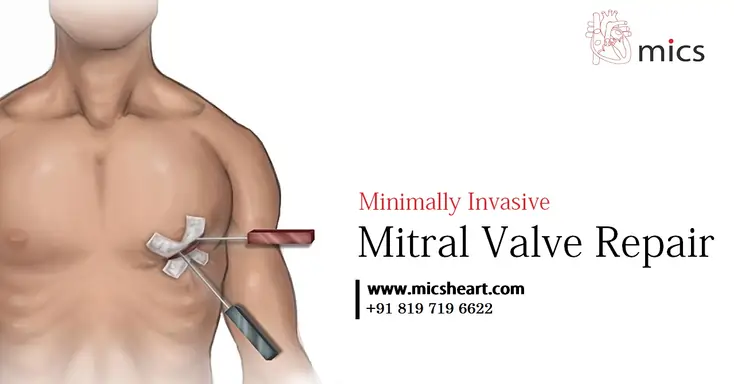Minimal invasive mitral valve repair is a method of treating a diseased mitral valve without cutting a chest bone or performing open-heart surgery. Minimally Invasive Mitral Valve Repair is performed to repair the diseased mitral valve, which helps blood circulation between the left ventricle and left atrium. It can be performed with the surgical robot, where your surgeon uses tiny cameras and tools to perform surgery. It is a safer alternative than traditional open-heart surgeries.
Mitral Valve Repair Procedure
Minimal invasive mitral valve replacement or surgery is performed if you have mitral valve disease such as:
Mitral valve regurgitation, which is caused due to the loosening of flaps of the mitral valve, causes blood leakage. It is often seen in people with mitral valve prolapse. Doctors highly recommend minimally invasive mitral valve surgery to treat this disease.
Mitral valve stenosis is caused due to narrowing of the mitral valve, which reduces the blood flow in the region.
Procedure
Here are the things performed before minimally invasive mitral valve surgery or replacement:
- The doctor performs an echocardiogram test to evaluate blood flow in your heart and to examine your heart valves.
- They can also do CT Scan if needed to examine your arteries.
- The doctor will give you general anaesthesia before performing minimally invasive mitral valve surgery.
During the minimally invasive mitral valve surgery
- The doctor makes a 2-3 inches incision near the sternum (breastbone).
- They divide the muscles to reach your heart and repair or replace the mitral valve.
- They insert an endoscope to inspect your mitral valve and perform surgical operations through special small surgical tools.
- The process usually takes 2-4 hours to complete.
- The surgeon can replace your mitral valve or repair it (if possible); in that case, they will perform Ring Annuloplsty or Valve Repair via sewing a metal ring around the valve.
- After finishing the surgery doctor will close the incision with stitches.
After minimally invasive mitral valve Replacement/surgery
- You will be put under observation in ICU for 24 hours and may get discharged within 3-4 days, depending on your condition.
- You need to follow a balanced diet and breathing exercises for quick relief.
- Stop smoking after surgery to avoid complications.
Follow these precautions before surgery:
- Ask the doctors in advance, such as when you should stop eating before surgery.
- Type of food you should consume before and after surgery.
- If any reactions and allergies persist, then speak to your doctor.
- Avoid wearing contact lenses, eyeglasses, jewellery, nail polish, and dentures during minimally invasive mitral valve surgery.
Benefits Of A Minimally Invasive Approach
- Minimal incision means you don’t need to undergo complicated and risky open-heart surgeries
- Rapid healing means you will heal faster and take less time to recover.
- Minimally invasive mitral valve surgery/replacement has a low risk of infection and blood loss during surgery.
- You will recover fast, which means short hospital stays, and you will not get burdened with expensive hospital bills.
- Minimal incision means reduced scarring due to surgical operation.
Risk and Complications
Possible risk of minimally invasive mitral valve surgery includes:
- Bleeding
- Blood clots
- Malfunction of the replacement valve
- Irregular heartbeats (arrhythmias)
- Infection
- Stroke
- Death
Recovery and Follow-up
You may feel weakness and tiredness for a few weeks after the surgery, but it will heal faster than traditional open-heart surgeries. The doctor may suggest when you can get to work and follow your daily routine. Visit the doctor for any side effects or complications, and you must have a general routine check-up after 15 days of your surgery. You can also follow breathing exercises, avoid smoking and eat a healthy diet for a fast recovery.
Why Choose Micsheart?
The minimally invasive mitral valve repair is a cardiac surgery that gained prominence in the 90s and 20s. It’s an easy and safe alternative to traditional heart surgeries, where the breastbone is cut in half to access the heart. In India, MiCS Heart started Minimally Invasive and Robotic Heart Surgery program in 2008 and now became the largest minimally invasive program and the only qualified robotic heart surgery program in the country.
We are top among our peers with 15 years of expertise and more than 3000 successful operations conducted across India. We are using the latest in-house technology and techniques to treat minimally invasive mitral valve repair. We perform 700 surgeries each year with a 99.5% success rate and 72 hours of rapid recovery for patients.
Say Goodbye to open surgeries, and Yes to Minimally Invasive Valve Surgery with proven advanced techniques of MiCS Heart.
FAQs
What is a minimally invasive mitral valve repair?
Ans. Minimal invasive mitral valve repair is a technique for repairing a mitral valve disease. It is an alternative to open-heart surgeries and requires only 2-3 inches cut to perform the treatment.
How Safe Is the Procedure?
Ans. Minimal invasive mitral valve surgery/replacement is a safe procedure that helps you to recover fast and have few complications.
Why might I need a minimally invasive mitral valve replacement?
Ans. You should opt for minimally invasive mitral valve replacement because it’s safe, and due to advanced techniques, it takes minimal incision to perform the treatment.
What are the advantages of minimally invasive mitral valve repair?
Ans. Minimal incision, rapid healing, low blood loss, and reduced scarring are some of the advantages of minimally invasive mitral valve repair.
Can the mitral valve be repaired without standard open-heart surgery?
Ans. Yes, the mitral valve can be repaired through minimal invasive mitral valve surgery/replacement.
How long does minimally invasive mitral valve repair surgery take?
Ans. It generally takes 2-4 hours to perform minimally invasive mitral valve repair surgery/replacement.
What is the recovery time after minimally invasive mitral valve repair?
Ans. You can recover within a few weeks after minimally invasive mitral valve repair surgery.

